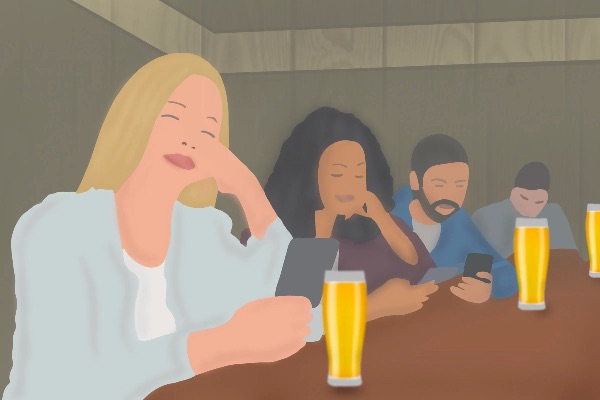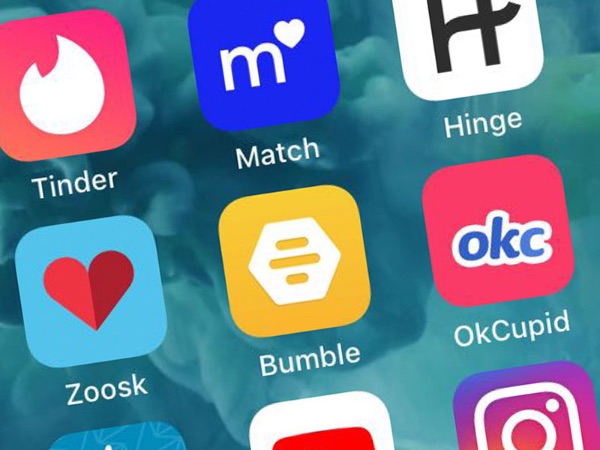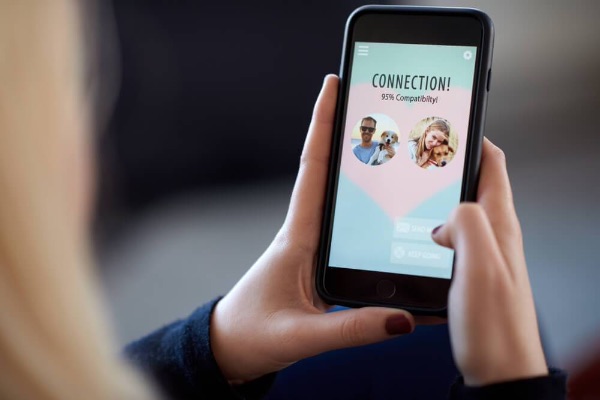Modern romance is dead, and Tinder killed it
|
|
11/17/2022 |

From FaceTime and instant messaging to the plethora of social media platforms on the internet, interconnected has perhaps become the most fitting term to describe contemporary society. And indeed, with our ability to communicate with anyone at the click of a button, we now have more opportunities to connect than ever before. All of this considered, one question remains: Why do so many Americans feel more lonely now than ever?
The answer may be rooted in the decline of genuine and authentic relationships, particularly romantic relationships. A study conducted at the University of California, Berkeley revealed that the number of Americans who do not have a steady romantic partner has increased by 50% since 1986.
Many experts are attributing this statistic to the rise of social media and casual dating apps, with nearly half of young adults in the U.S. reporting having used an online dating platform. Apps such as Tinder, Hinge, Bumble and OkCupid are all marketed with the promise to increase your chances of finding love. However, the numbers dont seem to add up: Despite the high volume of individuals who use these dating sites (about 53 million in 2022), only 12% of these individuals reported eventually forming a committed relationship.
The answer may be rooted in the decline of genuine and authentic relationships, particularly romantic relationships. A study conducted at the University of California, Berkeley revealed that the number of Americans who do not have a steady romantic partner has increased by 50% since 1986.
Many experts are attributing this statistic to the rise of social media and casual dating apps, with nearly half of young adults in the U.S. reporting having used an online dating platform. Apps such as Tinder, Hinge, Bumble and OkCupid are all marketed with the promise to increase your chances of finding love. However, the numbers dont seem to add up: Despite the high volume of individuals who use these dating sites (about 53 million in 2022), only 12% of these individuals reported eventually forming a committed relationship.

So, why is this the case? The ultimate goal of online dating apps should be to function as a conduit in creating committed relationships, right? Wrong. The realm of online dating has become a multi-billion dollar industry an industry that profits primarily off of user addiction, especially by keeping its users single. The way that the industry accomplishes this is twofold, relying on qualities of gamification and what psychologist Barry Schwartz refers to as the paradox of choice.
The presence of the choice paradox in online dating is perhaps best understood through the analogy of online shopping. Studies have shown that as shoppers are exposed to more options for potential purchases, they are paradoxically less likely to be satisfied with their ultimate decision. As our brains become inundated with a variety of choices, we often experience choice paralysis: An anxiety-induced state that prevents us from making a resounding decision.
On Tinder, the users experience of choice overload has become a frequent occurrence. In the emergence of what some are calling serial swipers, many users can be seen displaying strong hesitations to commit to a singular option due to fears of missing out on a potentially better one.
The infiltration of the choice paradox into the realm of relationships is especially dangerous. Unlike the case of online shopping, users arent choosing between products, theyre choosing between people. The resulting world of online dating has become a breeding ground for objectification, sexual harassment and insecurity, as choices are increasingly influenced by abundance and appearances rather than genuine compatibility.
The presence of the choice paradox in online dating is perhaps best understood through the analogy of online shopping. Studies have shown that as shoppers are exposed to more options for potential purchases, they are paradoxically less likely to be satisfied with their ultimate decision. As our brains become inundated with a variety of choices, we often experience choice paralysis: An anxiety-induced state that prevents us from making a resounding decision.
On Tinder, the users experience of choice overload has become a frequent occurrence. In the emergence of what some are calling serial swipers, many users can be seen displaying strong hesitations to commit to a singular option due to fears of missing out on a potentially better one.
The infiltration of the choice paradox into the realm of relationships is especially dangerous. Unlike the case of online shopping, users arent choosing between products, theyre choosing between people. The resulting world of online dating has become a breeding ground for objectification, sexual harassment and insecurity, as choices are increasingly influenced by abundance and appearances rather than genuine compatibility.

All of these conditions have combined to create an online dating environment that is less than ideal. And unfortunately, these negative impacts have been shown to disproportionately affect women. Studies have shown that women are significantly more likely to experience online abuse and harassment on these platforms than men. Specifically, in a study of women who had used some type of dating platform in the last 15 years, over one-third of them reported that they were sexually assaulted by someone they met on one of these apps. Reports of lowered self-esteem and feelings of objectification are also not uncommon. The ability of users to create an idealized, filtered version of themselves online can promote unhealthy thinking: Users are increasingly being conditioned to think that this filtered version of themselves is the only one that is reasonable to present to the outside world.
So, do these claims that the dating apocalypse is upon us actually hold any validity? The answer is complicated. While the rise of social media and online dating apps have perpetuated a strong hook-up culture, a growing awareness of the toxicity of these platforms has also created an equally strong counter-movement. Mounting pressure as a result of sexual harassment and lack of corporate oversight has spread awareness about the issue, fostering further research into how to correct the faulty nature of these apps. For the foreseeable future, however, it seems as though these apps are here to stay. Accordingly, users have a choice to make: In a world that is becoming increasingly digitized, it is up to each of us to decide whether we want our love lives to fall into that category as well.
So, do these claims that the dating apocalypse is upon us actually hold any validity? The answer is complicated. While the rise of social media and online dating apps have perpetuated a strong hook-up culture, a growing awareness of the toxicity of these platforms has also created an equally strong counter-movement. Mounting pressure as a result of sexual harassment and lack of corporate oversight has spread awareness about the issue, fostering further research into how to correct the faulty nature of these apps. For the foreseeable future, however, it seems as though these apps are here to stay. Accordingly, users have a choice to make: In a world that is becoming increasingly digitized, it is up to each of us to decide whether we want our love lives to fall into that category as well.
| Previous Blog | Next Blog |
